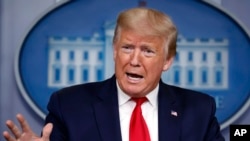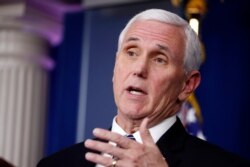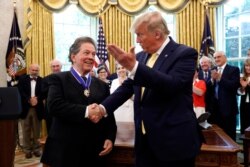A three-way telephone call about oil production took place Thursday involving U.S. President Donald Trump, Russian President Vladimir Putin and Saudi Arabian King Salman ahead of a deal announcement by the OPEC cartel and other countries.
"We had a big talk as to oil production and OPEC and making it so that our industry does well and the oil industry does better than it’s doing right now," Trump said at the start of a daily briefing by the White House coronavirus task force. “It was a very good call.”
The COVID-19 pandemic has depressed demand for energy, sending prices lower and endangering jobs in the industry.
OPEC and its allies, led by Russia, agreed Thursday to collectively cut oil output by more than a fifth. They said they expected the United States and other producers to join their effort to lift prices.
The unprecedented cut of 15 million barrels per day, however, still will not remove enough crude from production to stop storage facilities from becoming full, a problem Trump noted in his remarks to reporters.
“Oil today is not selling,” the president said. “We are storing millions of barrels of oil that nobody ever thought would even be possible.”
With administration officials expressing hope Thursday that the pandemic could be peaking in current hot spots, such as New York City, the global epicenter of infection, there is an increasing focus on considering when to reopen the U.S. economy, largely shut down because of the virus.
“We need to do it responsibly, and we’re going to follow the data” coming from public health reports, Vice President Mike Pence assured reporters at the task force’s daily briefing.
The Trump administration is close to announcing a second task force that will focus on economic issues.
Trump has made it clear he is impatient for a return to normalcy for American business but has said he will listen to his coronavirus task force team on timing.
Some of the president’s aides are reportedly pushing for a May 1 reopening for businesses.
An additional task force focused on the economy, rather than the one making its recommendations primarily based on epidemiology, could end up giving the president conflicting advice.
Some influential voices want economist Art Laffer, a polarizing figure in his field, to head the new task force. Laffer, who was awarded a White House medal last year by Trump, for decades has touted tax cuts as paying for themselves through fast growth.
Laffer’s critics say that almost never is the case in practice, although his theory was adopted by the Reagan administration and the economist is a mentor of one of Trump’s key officials in this arena, Larry Kudlow, who heads the National Economic Council.
The new task force “must focus its efforts on ensuring that the American people, not just wealthy shareholders and corporations, receive the assistance they need,” said Morris Pearl, chairman of Patriotic Millionaires. “This country can afford for corporate shareholders like myself to lose a small chunk of our investments over the next several months. It cannot afford to leave tens of millions of American workers without adequate financial support for any amount of time.”
Pearl, a former executive of BlackRock, the world’s largest asset manager, said he was not confident of that happening if Laffer was in charge of the task force.
“The godfather of trickle-down economics has nothing to offer besides more tax cuts for the rich, and in fact he’s already said that he believes it's bad to send additional aid to laid-off workers. If given free rein, I have no doubt that Art Laffer will drive millions of Americans into poverty from which they and their families will not recover for a generation,” Pearl told VOA.







